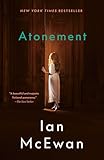
 I’m in the early stages of War and Peace and last night read a battle scene in which the Russian troops are retreating from the advancing French army. The chapter follows Nicholas Rostov, as he and his company try to cross the Danube in time to destroy the bridge behind them. The scene is written with a sort of detached, tableau quality that reminded me a lot of the evacuation of Dunkirk section in Atonement. I went back to McEwan’s book to look for passages that compared directly with Tolstoy’s writing and found a couple:
I’m in the early stages of War and Peace and last night read a battle scene in which the Russian troops are retreating from the advancing French army. The chapter follows Nicholas Rostov, as he and his company try to cross the Danube in time to destroy the bridge behind them. The scene is written with a sort of detached, tableau quality that reminded me a lot of the evacuation of Dunkirk section in Atonement. I went back to McEwan’s book to look for passages that compared directly with Tolstoy’s writing and found a couple:
The crush of men.
From War and Peace
The soldiers, crowded together shoulder to shoulder, their bayonets interlocking, moved over the bridge in a dense mass. Looking down over the rails Prince Nesvitski saw the rapid, noisy little waves of the Enns, which rippling and eddying around the piles of the bridge chased each other along. Looking on the bridge he saw equally uniform living waves of soldiers, shoulder straps, covered shakos, knapsacks, bayonets, long muskets, and, under the shakos, faces with broad cheekbones, sunken cheeks, and listless tired expressions and feet that moved through the sticky mud that covered the planks of the bridge.
From Atonement
The crowds were bunching up again. In front of the canal bridge was a junction and from the Dunkirk direction, on the road that ran along the canal, came a convoy of three-ton lorries which the military police were trying to direct into a field beyond where the horses were. But troops swarming across the road forced the convoy to a halt. The drivers leaned on their horns and shouted insults. The crowd pressed on. Men tired of waiting scrambled off the backs of the lorries. There was a shout of ‘Take cover!’
Observing nature in the thick of the retreat.
From Atonement
As they came out of the copse they heard bombers, so they went back in and smoked while they waited under the trees. From where they were they could not see the planes, but the view was fine. These were hardly hills that spread so expansively before them. They were ripples in the landscape, faint echoes of vast upheavals elsewhere. Each successive ridge was paler than the one before. He saw a receding wash of gray and blue fading in a haze towards the setting sun.
From War and Peace
Nicholas Rostov turned away and, as if searching for something, gazed into the distance, at the waters of the Danube, at the sky, and at the sun. How beautiful the sky looked; how blue, how calm, and how deep! How bright and glorious was the setting sun! With what soft glitter the waters of the distant Danube shone. And fairer still were the faraway blue mountains beyond the river, the nunnery, the mysterious gorges, and the pine forests veiled in mists to their summits.








